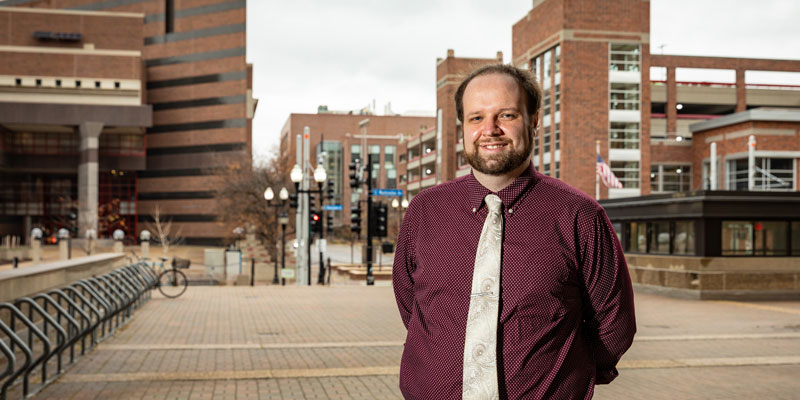Ian MacFarlane builds course helping genetic counseling students better understand cultural impacts in healthcare.

From physicians to therapists, interpersonal skills and understanding are critical to success in providing medical care to patients in the US and worldwide. Ian MacFarlane, research assistant professor in Genetics, Cell Biology and Development and co-chair of the GCD Diversity and Inclusion Committee together with associate professor Deanna Koepp, recently helped launch a course to help upcoming genetic counselors hone their skills in exactly that. Through “Cultural Competencies in Precision Medicine”, MacFarlane hopes he can help students expand their knowledge in working with various groups of people as they transition from the classroom to the clinic. We recently caught up with MacFarlane to learn more about his thoughts on this work and his new course.
What do you currently research and what about that area/field intrigues you?
My primary research area is professional development of clinicians, with an emphasis on clinical supervision. I'm fascinated by the mechanisms by which novices transition from lay helpers to clinical professionals and how we can facilitate that training as efficiently and effectively as possible. The challenge in healthcare is trainees are working with real patients so the quality of services cannot be sacrificed in efforts to help trainees develop. Maintaining this balance of patient and trainee needs is a complex process that requires careful attention by all parties.
What drew you to create the culture competence in precision medicine course?
When approached to develop an undergraduate course to help support a new minor we are putting together tentatively titled Health and Genomics, I immediately thought of cultural competence. Given my background in clinical work (my doctorate is in counseling psychology), I wanted to supplement the outstanding genomics/genetics education students would receive by structuring a course around the challenges of implementing genomics research into applied settings to give students a sense of how the laboratory translates to the clinic. Cultural competency is a critical component of healthcare and this was an opportunity to foreground it for our students.
What do you hope student take away from your course?
My two primary goals for students are to impress upon them the centrality of cultural competence in quality healthcare service and that cultural competence is a lifelong process. My course is less a "how-to manual" and more of an introduction to the range and depth with which cultural implications permeate our healthcare system. I want students to start and/or continue their development in how to approach health interactions in a culturally competent manner while recognizing that this journey is never finished.
How does cultural competency play a key role in being a successful practitioner in medicine?
The need to deliver quality health care to everyone in our society and reduce health disparities is an ethical imperative for medical providers. To succeed in this task, we need to tackle the issue at both the individual and the systemic level. From doing the personal work to identify one's own values, biases, and assumptions, to knowing the proper terminology to be welcoming and inclusive to patients with a wide variety of identities, to facilitating honest and open communication with patients who are rightfully distrustful of the medical establishment because of a history of mistreatment, to recognizing barriers in our systems that disproportionately affect marginalized groups, to being aware of the implications of how medical research does or does not generalize to certain groups of people because of disparities in sampling, cultural competence not only protects patients from mistreatment but enhances their experiences and promotes inclusive and equitable wellness.